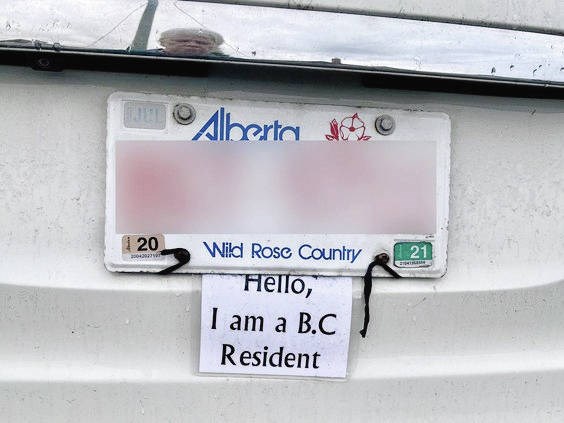Some B.C. residents with Alberta licence plates have become creative to avoid confrontation with those who might assume they are disregarding provincial travel restrictions.
Wendy McLellan was out for a walk in her Victoria neighbourhood when she noticed a car with an Alberta plate. Beneath the distinctive tag for “Wild Rose Country” was a homemade sign reading, “Hello, I am a B.C. resident.” McLellan said the sign made her feel a little sad. “Why are humans so judgmental?” she posted on Facebook.
Homemade signs and bumper stickers have been seen on vehicles with Alberta licence plates since B.C. health officials first advised people not to travel outside their community early in the COVID-19 pandemic.
On April 23, B.C. introduced its strictest travel orders yet, prohibiting people from travelling between three zones, including a combined zone for 91‘≠¥¥ Coastal Health and the Fraser Valley, another for the Northern and Interior health regions and a third for 91‘≠¥¥ Island. Anyone travelling for non-essential reasons could face a $575 fine.
The travel restrictions do not prohibit interprovincial travel, which means there are no penalties for Albertans or any out-of-province travellers who come to B.C. unless they cross regional boundaries.
Peter Milobar, B.C. Liberal MLA for Kamloops-North Thompson, said he’s heard from frustrated constituents who feel the province’s travel restrictions are tougher on British Columbians than interprovincial travellers. “They don’t understand why a B.C. resident is subjected to one set of rules and an Alberta resident is subjected to another set of rules,” he said.
That disparity may have contributed to a backlash against those with Alberta licence plates, despite evidence from B.C. border towns that out-of-province tourism has all but dried up.
But there are several reasons why a B.C. resident might have an Alberta licence plate.
In a statement, ICBC said a vehicle that spends 30 days or more in B.C. needs to be registered in this province, meaning new residents may still be driving under their old plates. There are also some exceptions, including for students who may be temporarily residing in B.C. or members of the military.
Golden resident Jessica Grey had a negative experience last May when her mother-in-law let her use her Alberta-registered car to do some grocery shopping. She returned to the vehicle to find a sticky note that read “go home” stuck to the window.
“It really threw me off at the time,” she said. “I didn’t think people would do that.” Grey was hesitant to drive the car again and parked it for a time.
“In a border town like this, there are a lot of people who work in Alberta but are based in B.C. If we react that way to Albertans, how do we expect to be treated when we go to Alberta?” she said.
Grey said Golden has “calmed down quite a bit” since the early days of the pandemic, but she hopes people will think before lashing out.
Sheila Brand’s son is moving back to B.C. after finishing his medical residency in Saskatchewan. He visited for two months this year and was worried his car might be vandalized. He’s planning to switch the registration to B.C. as soon as possible.
“I think we need to take a step back and think before we jump to conclusions,” she said.
Homemade bumper stickers might encourage some people to think twice. Lisa MacInnis said she noticed a vehicle in a parking lot in West Kelowna that has Alberta plates and a bumper sticking reading “Proud to be Living and Working in B.C.”
“It is sad that is has come to that,” she said.
